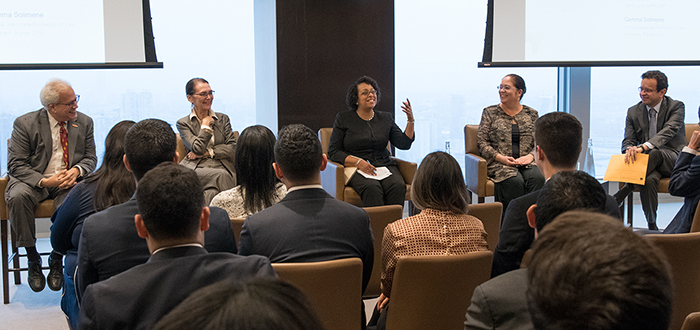In the 55 years from 1960 to 2015, the Latino population in the United States has increased by almost 900%. Demographic change of this sort raises important questions about the current standing and treatment of this diverse community, particularly as the country celebrates the 150th anniversary of the ratification of the Constitution’s Fourteenth Amendment, which guarantees equality, dignity, and due process for all.
On October 11, Fordham Law’s Center on Race, Law & Justice partnered with Goldman Sachs to present “Immigration, Citizenship, and Belonging in 21st Century America,” a panel discussion that invited experts to consider the major challenges to formal citizenship for Latinos in the United States as well as obstacles to informal citizenship or “belonging,” such as inequality and stigma. The event covered issues such as the separation of immigrant families at the U.S. border, efforts to include a citizenship question on the U.S. Census, and debates about DACA for undocumented youth.

Speakers from Fordham included Clinical Associate Professor Gemma Solimene and University Professor Clara Rodriguez. Nina Perales from Mexican American Legal Defense Fund and Jose Luis Perez from LatinoJustice PRLDEF rounded out the panel. Javier Rodriguez, a managing director in Goldman Sachs’ Operations Division and co-head of the Firmwide Hispanic/Latino Network, moderated.
Panelists discussed the effect that media portrayals of Latinos have on Latino communities, the emphasis on enforcement and citizenship versus education and employment, civil rights of Latinos, the role of advocacy organizations, and voting rights and the midterm elections.
The event attracted professionals from the legal and financial spheres. It is one of many programs that the Center hopes to engage in as part of its mission to improve diversity and inclusion in public and private institutions. For more information, please visit the Race, Law and Justice Center’s site, or contact Robin Lenhardt, faculty director of the center.


